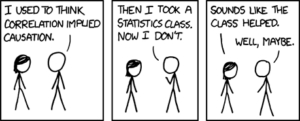So I Like Statistics, Now What?
By Jake Working
Whether you’ve taken a statistics class, recently read a report from your data analyst, or simply want to make data-driven decisions, something about statistics just clicked with you. But what comes next? What can you do with this newfound passion?

I’m Jake Working, a current PhD student in the Evaluation, Statistics, and Methodology at the University of Tennessee, and I had similar questions after my first statistics class in college. In this post, I’ll discuss methods and rationale to improve your statistical skill set and an introduction to the methodology, evaluation, statistics, and assessment (MESA) fields.
Overview
1. Explore Statistics: Methods to improve your statistical skill set
2. Discover Your Motivation: Refine your rationale for statistical application
3. What is MESA? An introduction to the fields
Explore Statistics
Now that you have found an interest, keep learning! If you are still in college, consider a statistics minor or simply taking a few courses outside your major. As an engineering student in college, I was able to take additional statistics-related courses, such as business statistics and statistical methods in Six Sigma. Most institutions offer topical statistical-based courses such as business statistics and quality methods, but it is important to consider foundational statistics courses taught in a mathematical environment to have a basic understanding of statistical theory and methodology.

Image Credit: XKCD
Creating a foundational knowledge of statistics does not have to be expensive, though. If you aren’t currently a college student, there are endless opportunities to gain statistical knowledge for free! A popular statistical analysis program, R, is available free and open source. I recommend an interface such as RStudio or BlueSky (both also free and open source) to use with R, and a certification course to get started (such as this one offered by Johns Hopkins). In the manufacturing industry, statistical analysis related to Six Sigma or quality control would be more beneficial, and there are many options to become Six Sigma certified.
Discover Your Motivation
Why did you initially enjoy statistics? I was drawn to multiple aspects related to statistical analysis such as data visualization and data-driven decision making which ultimately led me to the MESA field.
At first, I was motivated by statistical reporting and data visualization techniques that allowed complex, but useful, information to be distilled into digestible and easy to understand information. While it may be natural to some, data visualization is a learned and ever-changing process. If you are interested in this area, I recommend checking out Stephanie Evergreen’s Evergreen Data for data visualization checklists, best practices, and online courses!
Most importantly, I enjoyed being able to support any decision I made with data. This motivation allowed me to weave statistical methods for the purpose of data-driven decision making into any role I was working. Data-driven decision making is popular in any field, because it allows you to have substantial rationale and evidence to create progress. If you were like me, I enjoyed the field I was working in, and wanted to formally apply these motivations in my field. Enter the MESA fields.
What is MESA?
The interwoven fields of methodology, evaluation, statistics, and assessment (MESA) include a growing number of career opportunities for those who started with an initial passion for statistics. While you likely understand statistics, how do the other fields connect?
Methodology, in this application, relates to the systems (or methods) of gathering information related to a particular problem (Charles, 2019). It is the “how” you gather and address your question or problem. Examples of methodologies include qualitative, quantitative, and mixed methods. The Grad Coach has a great resource on defining research methodology. You can think of statistics and methodology as the tools used to conduct assessments and evaluations, the other areas of MESA.
Evaluation refers to the process of determining the merit, worth, or value of a process or the product of that process (Scriven, 1991, p. 139). One common area within this field is program evaluation, which focuses on the evaluation of program objectives and will lead to decisions regarding the program.
Assessment is often defined as “any effort to gather, analyze, and interpret evidence which describes institutional, divisional, or agency effectiveness (Upcraft & Schuh, 1996, p. 18). The main goal of assessment is to gather information in order to improve performance. Examples of assessment include standardized tests, surveys, homework or exams, or self-reflection (Formative, 2021).
If you’d like to gain an understanding of what type of careers lie within these fields, search for jobs related to: evaluation, assessment, methodologist, data analyst, psycho-metrics, or research analyst.
References
Charles, H. (2019). Research Methodology Definition [PowerPoint slides]. SlidePlayer. https://slideplayer.com/slide/13250398/
Formative and Summative Assessments. Yale Poorvu Center for Teaching and Learning. (2021, June 30). Retrieved March 26, 2023, from https://poorvucenter.yale.edu/Formative-Summative-Assessments
Scriven, M. (1991). Evaluation Thesaurus. Sage. https://files.eric.ed.gov/fulltext/ED214952.pdf
Upcraft, M. L., & Schuh, J. H. (1996). Assessment in Student Affairs: A Guide for Practitioners. The Jossey-Bass Higher and Adult Education Series. Jossey-Bass Inc., Publishers, 350 Sansome St., San Francisco, CA 94104.
